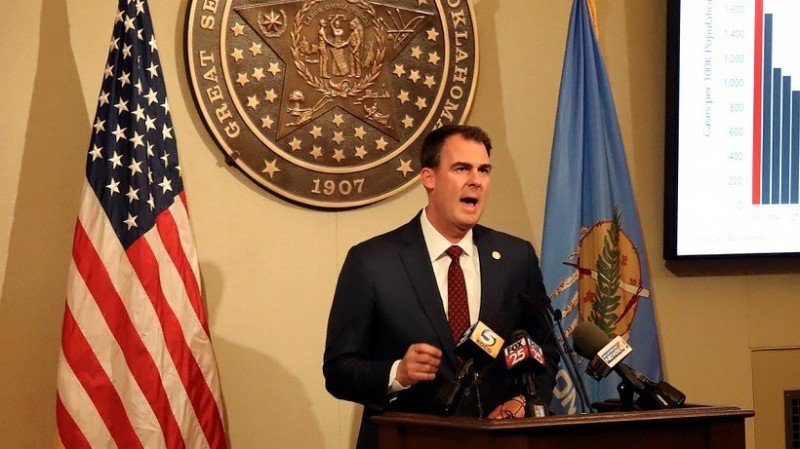US Interior Department approves Oklahoma gambling compacts with two tribes

The US federal government approved new gambling compacts between Oklahoma and two tribal nations, Gov. Kevin Stitt announced on Monday, but the governor still remains locked in a legal dispute over tribal gambling with other tribes and legislative leaders from his own party.
The compacts between Oklahoma and the Otoe-Missouria Tribe and the Comanche Nation were both “deemed approved” by the U.S. Department of the Interior following the expiration of a 45-day review period, the Associated Press reports.
In a statement, Stitt praised the leaders of the two tribes “who worked hard to secure fair terms for their citizens, and whose contributions throughout the negotiations ensured a more level playing field and modernized gaming market in Oklahoma.”
Oklahoma Attorney General Mike Hunter, who issued a legal opinion that Stitt overstepped his authority with the compacts and urged the Department of the Interior to reject them, criticized the agency for its “thoughtless and irresponsible inaction.”
“The tribes cannot begin operating under the terms of these compacts until the many questions that remain pending before the Oklahoma Supreme Court are resolved,” Hunter said. “I am deeply disappointed in Interior Secretary (David) Bernhardt’s abdication of his responsibility to all of Oklahoma’s Native American sovereigns, not just two.”
Our new gaming compacts with the Comanche Nation & Otoe-Missouria Tribe are approved by @Interior. These will:
— Governor Kevin Stitt (@GovStitt) June 9, 2020
✅ Expand gaming opportunities
✅ Deliver Certainty for gaming fees that support Oklahoma public schools
✅ Strengthen State-Tribal relationships for generations to come pic.twitter.com/eOlsOpRmnz
The new compacts authorize the tribes to offer additional forms of gambling, including sports betting, and to build new casinos closer to metropolitan areas that would give the state a larger cut of revenue, although it’s not clear when either of those might occur. Hunter has said sports gambling remains illegal under state law, and any attempt by the two tribes to build new casinos would likely face opposition from other tribes already operating casinos in those areas.
In response to the Interior’s decision, Cherokee Nation Principal Chief Chuck Hoskin Jr. said no federal official can give Stitt the needed authority to legally bind the state to the compacts and that Interior officials were not willing to say the compacts were consistent with federal law. “Instead, the Department of the Interior dodged the question and left the governor, Comanche Nation, and Otoe-Missouria Tribe looking at months or years of continued litigation,” Hoskin said, as reported by Cherokee Phoenix. “It’s hard to see how any of this equals a ‘win’ for Governor Stitt or for the citizens of Oklahoma.”
Stephen Greetham, senior counsel for the Chickasaw Nation, one of the tribes that has sued the governor over the existing gambling compacts, said the new agreements are only authorized to the extent that they don’t violate federal law. “The risk of the agreements’ illegality remains with Governor Stitt and the two signing Tribes, and since several federal law defects have already been publicly documented, more litigation is likely,” Greetham said in a statement.
Meanwhile, the state’s Republican legislative leaders last week asked the Oklahoma Supreme Court to settle whether the governor overstepped his authority when he reached the new deals.
The federal government approved Oklahoma’s new gaming compacts with the Comanche Nation & the Otoe-Missouria Tribe, demonstrating our good faith efforts to level the playing field for our Tribal partners & deliver a modernized gaming market in the state.https://t.co/oXpkvIXv1Z pic.twitter.com/MF88t2DqQi
— Governor Kevin Stitt (@GovStitt) June 9, 2020
Moreover, the governor remains locked in a legal dispute with 10 other Oklahoma-based tribal nations after three of the state’s most powerful tribes — the Cherokee, Chickasaw and Choctaw nations — sued the governor late last year. The key point of contention is whether the compacts signed 15 years ago automatically renewed on Jan. 1. Stitt’s position is that the compacts expired on Jan. 1, while the tribes contend all the requirements were met for the compacts to renew for another 15 years.


















































